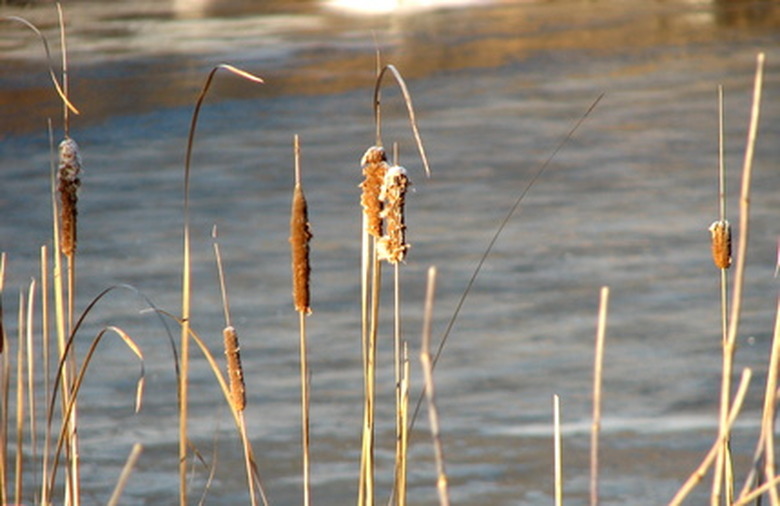Can I Use Roundup Near Open Water?
We may receive a commission on purchases made from links.
Roundup is a brand name for a weed-killing product called glyphosate, which is nonselective and kills virtually any plants it touches. Though Roundup comes in various weed- and grass-killing formulas, the differences are usually more chemicals added to the glyphosate, and some of those may be more hazardous to the environment than glyphosate itself. Roundup product labels instruct users not to allow the substance to wash down storm drains or drainage ditches or into surface waters in order to protect the environment. Such herbicide chemical formulations could kill plants around open water, negatively affecting aquatic life relying on these plants for shelter and food.
How Glyphosate Works
How Glyphosate Works
Any herbicides containing glyphosate, including Roundup, work in essentially the same way, traveling from a plant's foliage down into the root system and disrupting an enzyme essential to plant growth. It's a post-emergent herbicide, which means it only works on plants that are already established rather than on seeds that haven't yet sprouted through the soil. Within a few days, any sprayed plants yellow and eventually die. This includes desirable plants accidentally sprayed with glyphosate.
Some glyphosate products are used to treat weeds around waterways, but it only works if the herbicide coats the foliage exposed to air, as it disperses quickly when mixed with water. It's not ideal to use Roundup or any nonselective herbicide near open water, as overspray may kill desirable aquatic plants benefiting the water and the wildlife within it.
Using Roundup Effectively
Using Roundup Effectively
Roundup's various formulations are nonselective herbicides, which means they're capable of killing all plants rather than specific weeds on your target list. The packaging for each Roundup product mentions how to target specific weeds using any particular formulation, as some come with sprayer attachments that allow for better control of the liquid once it leaves the bottle.
All Roundup product labels recommend applying the substance on a calm day when it's not raining. Do not use Roundup when it's windy because the herbicide ends up in places other than intended. It's also an eye irritant. The product label specifies that the herbicide is harmful to people and domestic animals and that it's not safe to enter the area until after the solution dries.
Wear protective clothing, gloves, and eye protection when using Roundup and wash your hands thoroughly afterward. The pro-grade Roundup label specifically recommends not allowing the substance to get into water nor allowing it to contaminate food. It also says to avoid the sprayed area for a while and to discard clothing onto which the contents spill. The reason is because Pro Roundup is highly concentrated at 40 percent glyphosate, while the typical roundup formulations contain about 2 percent glyphosate.
Roundup and Aquatic Life
Roundup and Aquatic Life
While low percentages of glyphosate are unlikely to cause much damage to aquatic life, the other chemicals, including surfactants within Roundup, could be more toxic. Spilled herbicides that run off into the waterways may also harm fish, plant life, and even microbial life relying on that water. Any plants directly in or around areas such as ponds are important to the aquatic ecosystem, and altering that ecosystem by killing nearby plants could harm the pond life relying on those plants.
The fact that Roundup's product labels specifically mention keeping the herbicide from getting into waterways should be reason enough to avoid spraying it near open water. Always read all of the warnings on any herbicide label before application, as many chemicals that kill plants could indirectly poison or harm pollinators, birds, and other wildlife important to your local ecosystem.
